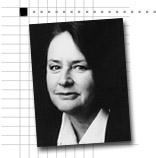Many of the invaluable contributions women have
made in front of and behind the camera are chronicled in Cari Beauchamp's new biography, Without
Lying Down: Frances Marion and the Powerful Women of Early Hollywood. Beauchamp is
scheduled to speak about the topics covered in her book at the Sixth Annual Buster Keaton
Celebration: Keaton & Pickford, Everyman & America's Sweetheart at the Bowlus Fine
Arts Center in Iola, KS, on Sept. 25-26. Her presentation will be on Saturday.
Beauchamp chose screenwriter Frances Marion (1887-1973) as
the focus of her study. Contacted by phone from Pasadena, CA, she recalls, "I was
initially intrigued by a group of women. For that I mean: Anita Loos (Gentlemen Prefer
Blondes), Adela Rogers St. John (A Free Soul), Frances Marion, and the list
goes on. I had seen their names on so many movies and yet failed to see them in any of the
Hollywood histories, which I devoured. I would find their names in the footnotes, and the
footnotes would be contradictory.
"Then, once I started on this trail, Frances Marion
quickly percolated to the top of the group, and her life was so rich, both professionally
and personally. She was this incredible central character who knew so many people. She was
pivotal in other people's lives and vice versa," Beauchamp says.
Marion's accomplishments as a writer are
nothing short of prodigious. She contributed to hundreds of films including Victor
Sjöström's The Scarlet Letter (1926) and The Wind (1928) and George Cukor's
Dinner at Eight (1933). Two of her scripts, The Big House (1930) and The Champ
(1931), won Oscars, and for almost 20 years she was Hollywood's highest-paid screenwriter.
Beauchamp says, "Frances was usually brought in after other people had been hired and
(the studio) had sort of given up, and then she started anew. That was certainly true with
The Scarlet Letter. Three other people had turned in scripts before Frances was
called in. What made her so special was she wrote stories that moved. She was perfect to
take something that had been a play, i.e. something that had been in a confined space,
take it out and open it up. She knew which characters were going to move the story
forward."
Writing wasn't Marion's only skill. She directed two
successful films (Just Around the Corner and The Love Light), worked as a
World War I correspondent, raised two sons, played concert-level piano and spent her later
years as a sculptor.
Marion also had an eye for talent in others. In fact, two
of Hollywood's top leading men owed her an enormous debt. "She tried to promote both
Clark Gable and Gary Cooper," Beauchamp explains. "What we would now call 'the
suits,' particularly with Gable, saw the clips and the screen tests and just laughed. The
casting director called (Gable) 'the sugar bowl' because of his enormous ears. Frances, in
both cases, encouraged and was successful in organizing an all-woman screening with the
secretaries. That convinced 'the suits' that maybe indeed these men had something."
Marion was one of several women who wielded this kind of
influence with studios. During an era when women's career options were limited to
teaching, nursing, typing or being a housewife, half the writers in Hollywood were female.
Beauchamp elaborates, "During the teens, (filmmaking) wasn't taken seriously as a
business. Because it wasn't taken seriously as a profession, it was open not just to
women, but to entrepreneurial misfits of all kinds. Louis B. Mayer (the head of
Metro-Goldwyn-Mayer), (Paramount boss) Adolph Zukor and (legendary producer) Sam Goldwyn
could not have gone as easily into any other profession and risen to the top. We're
talking about a junk man, a furrier and a glove salesman."
Despite Marion's considerable legacy, Beauchamp says the
screenwriter didn't take herself too seriously. "She respected moviemaking as an art.
She would then turn around and call her estate, 'The House that Bunk Built.' She realized
she wasn't writing Ulysses here." In addition, Marion used her power to help friends
like actress Marie Dressler and writer Lorna Moon when both were desperate. Beauchamp
states, "Much of her self-worth and personal gratification came from being able to
use her status to help other people. That would put a smile on Frances' face much more
than an Oscar."
Beauchamp says Marion's generosity came as a pleasant
surprise. "I had no idea. I feel so grateful. I have friends who've written
biographies about people like Mary Pickford and Dorothy Parker. They were actually
fascinating, but boy, I wouldn't want to spend five years with them on the level you do
with this kind of work. I grew to love (Marion). I'd joke I get to spend the day with my
'dead girlfriend,'" she says.
The biographer's work has gained similar affection from
reviewers. The Washington Post Book World called Without Lying Down,
"an impressively innovative work," and The New York Times selected it as
a "notable book." "It's been rewarding in every way but financially,"
she says laughing.



